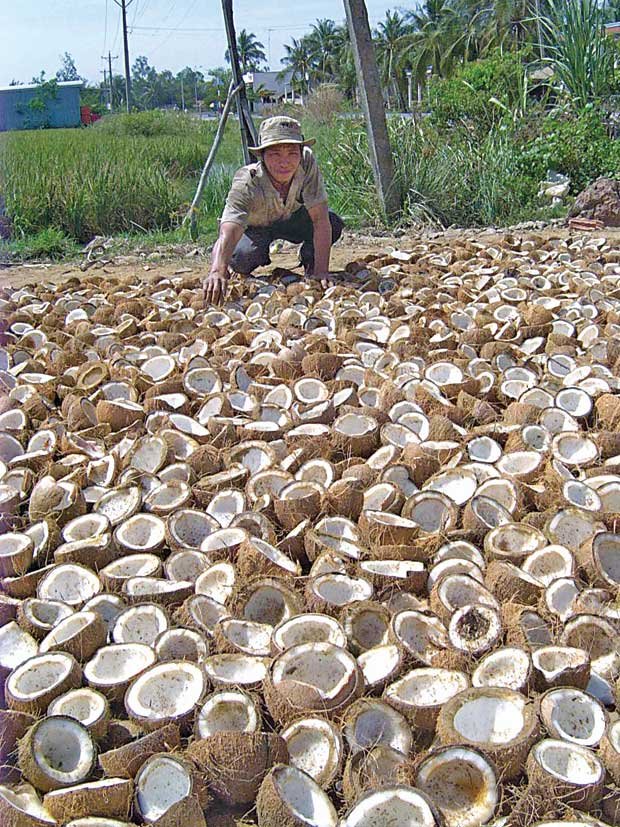VietNamNet Bridge – Some years ago, local authorities felt inspired reporting
the increasingly high coconut growing areas. Nowadays, they feel puzzled because
the coconut prices have fallen dramatically, pushing coconut growers against the
wall.

The coconut price has fallen dramatically recently, while farmers, who suffered
from the price falls, have decided to chop down coconut palms to grow other
trees. They think that with the oversupply and the economic crisis, there would
be no future for them.
According to the owner of a business which has been making products from
coconuts for 20 years, in other Asian countries, the coconut growing area is
very big. Indonesia has 4 million hectares of coconuts, the Philippines more
than 3 million hectares, India 2 million and Sri Lanka 400,000 hectares.
Meanwhile, there are 150,000 hectares of coconut palm growing area in Vietnam,
which is not a big figure at all.
The coconut price would be stable, while coconut export turnover would increase
if Vietnam can find more export markets.
Coconut price falling should not be blamed on crisis
Since the benefits from coconut palms have become more and more attractive,
Asian countries have been trying to expand the growing area. All the countries
had a bumper coconut crop this year, and all of them have been exporting
coconuts, mostly to China.
Vietnamese coconuts have been favored by Chinese merchants, who believe that
Vietnamese coconuts have higher quality than the products from other countries.
Chinese observant merchants easily realized right at the very first days of
harvesting, that Vietnam has high productivity this year, when they saw a lot of
boats carrying coconuts. Therefore, they have forced the prices down. As a
result, coconuts have become dirt cheap, while other products made of coconuts
have also fallen dramatically.
To date, China remains the biggest coconut buyer from Vietnamese farmers, which
explains why they control the market prices.
The Ben Tre local authorities have said that the world’s economic crisis has
negatively affected the supply and demand, thus leading to the plunge of the
coconut prices. However, businesses believe that it is the Chinese merchants’
action to press the price down which has caused the problem, not the economic
crisis.
Local authorities get puzzled
According to APCC, Vietnam only has 150,000 hectares of coconuts, but the
150,000 hectares can bring the high benefits like one million hectares.
In 2010, Indonesia earned 940 million dollars from coconut exports. Meanwhile,
Ben Tre province alone earned 75 million dollars with the coconut growing area
just equal to 1/100 of Indonesia’s area.
APCC has many times urged Vietnam to set up a clear strategy on coconut
development. India has a coconut development committee which is planning to
establish 5000 coconut-drink shops nationwide.
It has also the national coconut fiber which is moving ahead with the plan to
set up 30 shops to display products, which aims to attract more travelers’
attention to the products. The committee believes that this is a good measure
that helps India ease its reliance on the China, which buys coconut fiber from
India to resell in the world market.
Meanwhile, Vietnam has not kicked off any big scaled projects on coconut
production and export because of many reasons. Nguyen Van Nhu, Director of Sau
Nhu Company in Ben Tre, said that enterprises need capital to store products and
build storehouses. However, as the interest rates remain sky high, no one dares
to spend money on this.
Source: SGTT
- © Copyright of Vietnamnet Global.
- Tel: 024 3772 7988 Fax: (024) 37722734
- Email: evnn@vietnamnet.vn